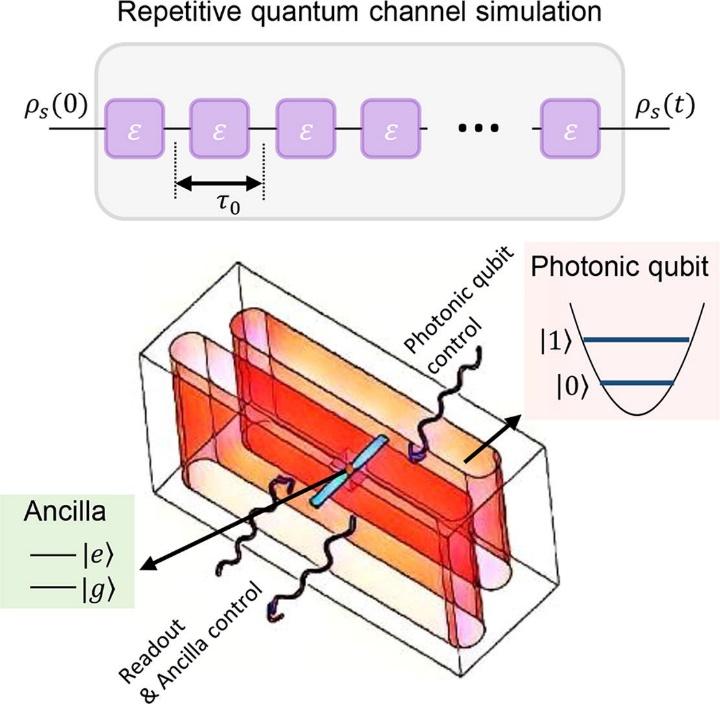Arbitrary quantum channel simulation for a superconducting qubit

The schematic of the quantum channel simulation based on superconducting quantum system. Credit: ©Science China Press
The experimental studies on the quantum channel will not only deepen our understanding of the quantum open system, but also improve our ability to control the evolution of a quantum system, which is beneficial for the researches on quantum information and quantum computation.
Therefore, the realization of arbitrary operation on a quantum bit, i.e. the simulation of an arbitrary quantum channel, is of great significance.
Recently, a research team lead by Luyan Sun from Tsinghua University collaborates with Chang-Ling Zou from University of Science and Technology of China, realized the arbitrary quantum channel simulation for a single qubit in a superconducting quantum circuit, and realized the arbitrary operation on a quantum bit.
The experiments are based on a three-dimensional microwave cavity and a coupled superconducting transmon qubit, with the cavity serving as the target qubit and transmon serving as an ancillary qubit, the arbitrary repetitive quantum channel simulation on the photonic qubit is realized.
It is worth mentioning that, they developed a novel experimental scheme to realize the open quantum system control, with only minimum quantum resources of a single ancillary qubit and the real-time quantum feedback technology. Such a scheme can also be generalized to a higher dimension to realize arbitrary qudit channel simulation, which still only requires only single ancillary qubit.
The demonstrated quantum channel simulation can deterministically simulate the quantum bit evolution in an arbitrary physical environment and generated arbitrary quantum mixed state, would play an important role in the future applications, including quantum computation and quantum simulation.
###
This work is supported by the National Key Research and Development Program of China (2017YFA0304303), National Natural Science Foundation of China (11474177), and Anhui Initiative in Quantum Information Technologies (AHY130000).
For more details, see:
Ling Hu, Xianghao Mu, Weizhou Cai, Yuwei Ma, Yuan Xu, Haiyan Wang, Yipu Song, Chang-Ling Zou, Luyan Sun. Experimental repetitive quantum channel simulation, Science Bulletin, 2018, 63(23):1551-1557, doi: 10.1016/j.scib.2018.11.010
https:/
Media Contact
All latest news from the category: Physics and Astronomy
This area deals with the fundamental laws and building blocks of nature and how they interact, the properties and the behavior of matter, and research into space and time and their structures.
innovations-report provides in-depth reports and articles on subjects such as astrophysics, laser technologies, nuclear, quantum, particle and solid-state physics, nanotechnologies, planetary research and findings (Mars, Venus) and developments related to the Hubble Telescope.
Newest articles

Why getting in touch with our ‘gerbil brain’ could help machines listen better
Macquarie University researchers have debunked a 75-year-old theory about how humans determine where sounds are coming from, and it could unlock the secret to creating a next generation of more…

Attosecond core-level spectroscopy reveals real-time molecular dynamics
Chemical reactions are complex mechanisms. Many different dynamical processes are involved, affecting both the electrons and the nucleus of the present atoms. Very often the strongly coupled electron and nuclear…

Free-forming organelles help plants adapt to climate change
Scientists uncover how plants “see” shades of light, temperature. Plants’ ability to sense light and temperature, and their ability to adapt to climate change, hinges on free-forming structures in their…





















